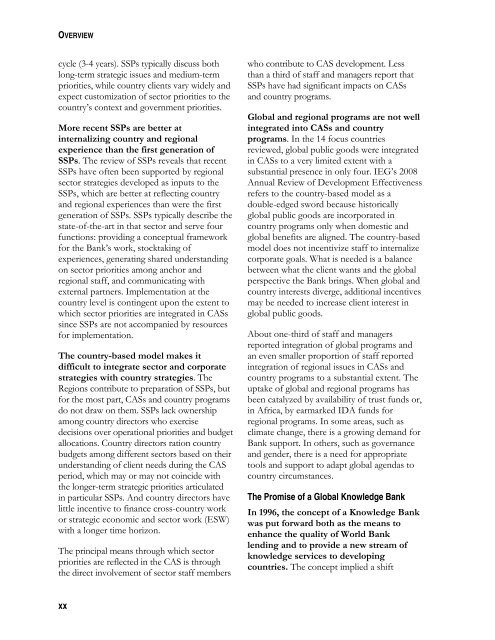The Matrix System at Work - Independent Evaluation Group - World ...
The Matrix System at Work - Independent Evaluation Group - World ...
The Matrix System at Work - Independent Evaluation Group - World ...
You also want an ePaper? Increase the reach of your titles
YUMPU automatically turns print PDFs into web optimized ePapers that Google loves.
OVERVIEW<br />
cycle (3-4 years). SSPs typically discuss both<br />
long-term str<strong>at</strong>egic issues and medium-term<br />
priorities, while country clients vary widely and<br />
expect customiz<strong>at</strong>ion of sector priorities to the<br />
country’s context and government priorities.<br />
More recent SSPs are better <strong>at</strong><br />
internalizing country and regional<br />
experience than the first gener<strong>at</strong>ion of<br />
SSPs. <strong>The</strong> review of SSPs reveals th<strong>at</strong> recent<br />
SSPs have often been supported by regional<br />
sector str<strong>at</strong>egies developed as inputs to the<br />
SSPs, which are better <strong>at</strong> reflecting country<br />
and regional experiences than were the first<br />
gener<strong>at</strong>ion of SSPs. SSPs typically describe the<br />
st<strong>at</strong>e-of-the-art in th<strong>at</strong> sector and serve four<br />
functions: providing a conceptual framework<br />
for the Bank’s work, stocktaking of<br />
experiences, gener<strong>at</strong>ing shared understanding<br />
on sector priorities among anchor and<br />
regional staff, and communic<strong>at</strong>ing with<br />
external partners. Implement<strong>at</strong>ion <strong>at</strong> the<br />
country level is contingent upon the extent to<br />
which sector priorities are integr<strong>at</strong>ed in CASs<br />
since SSPs are not accompanied by resources<br />
for implement<strong>at</strong>ion.<br />
<strong>The</strong> country-based model makes it<br />
difficult to integr<strong>at</strong>e sector and corpor<strong>at</strong>e<br />
str<strong>at</strong>egies with country str<strong>at</strong>egies. <strong>The</strong><br />
Regions contribute to prepar<strong>at</strong>ion of SSPs, but<br />
for the most part, CASs and country programs<br />
do not draw on them. SSPs lack ownership<br />
among country directors who exercise<br />
decisions over oper<strong>at</strong>ional priorities and budget<br />
alloc<strong>at</strong>ions. Country directors r<strong>at</strong>ion country<br />
budgets among different sectors based on their<br />
understanding of client needs during the CAS<br />
period, which may or may not coincide with<br />
the longer-term str<strong>at</strong>egic priorities articul<strong>at</strong>ed<br />
in particular SSPs. And country directors have<br />
little incentive to finance cross-country work<br />
or str<strong>at</strong>egic economic and sector work (ESW)<br />
with a longer time horizon.<br />
<strong>The</strong> principal means through which sector<br />
priorities are reflected in the CAS is through<br />
the direct involvement of sector staff members<br />
who contribute to CAS development. Less<br />
than a third of staff and managers report th<strong>at</strong><br />
SSPs have had significant impacts on CASs<br />
and country programs.<br />
Global and regional programs are not well<br />
integr<strong>at</strong>ed into CASs and country<br />
programs. In the 14 focus countries<br />
reviewed, global public goods were integr<strong>at</strong>ed<br />
in CASs to a very limited extent with a<br />
substantial presence in only four. IEG’s 2008<br />
Annual Review of Development Effectiveness<br />
refers to the country-based model as a<br />
double-edged sword because historically<br />
global public goods are incorpor<strong>at</strong>ed in<br />
country programs only when domestic and<br />
global benefits are aligned. <strong>The</strong> country-based<br />
model does not incentivize staff to internalize<br />
corpor<strong>at</strong>e goals. Wh<strong>at</strong> is needed is a balance<br />
between wh<strong>at</strong> the client wants and the global<br />
perspective the Bank brings. When global and<br />
country interests diverge, additional incentives<br />
may be needed to increase client interest in<br />
global public goods.<br />
About one-third of staff and managers<br />
reported integr<strong>at</strong>ion of global programs and<br />
an even smaller proportion of staff reported<br />
integr<strong>at</strong>ion of regional issues in CASs and<br />
country programs to a substantial extent. <strong>The</strong><br />
uptake of global and regional programs has<br />
been c<strong>at</strong>alyzed by availability of trust funds or,<br />
in Africa, by earmarked IDA funds for<br />
regional programs. In some areas, such as<br />
clim<strong>at</strong>e change, there is a growing demand for<br />
Bank support. In others, such as governance<br />
and gender, there is a need for appropri<strong>at</strong>e<br />
tools and support to adapt global agendas to<br />
country circumstances.<br />
<strong>The</strong> Promise of a Global Knowledge Bank<br />
In 1996, the concept of a Knowledge Bank<br />
was put forward both as the means to<br />
enhance the quality of <strong>World</strong> Bank<br />
lending and to provide a new stream of<br />
knowledge services to developing<br />
countries. <strong>The</strong> concept implied a shift<br />
xx

















